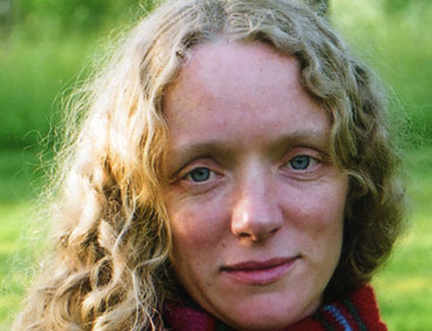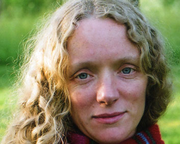The things I brought with me when I knew we were leaving home forever
By Jenny Valentine
We have commissioned a new piece of writing from fifty leading authors on the theme of 'Elsewhere' - read on for Jenny Valentine's contribution.
My grandmother was the thinnest woman I ever knew. Her ankles stuck like reeds from the dark, weighted pools of her shoes. Her wrists, busy and snappable and determined, drowned in their sleeves. Her clothes always billowed, hitched up and cinched in with string and extra stitches.
She might actually have fit in my suitcase, if we’d had time.
She was so light and so quick, when I was little I thought the wind might pick her up and take her, but it never did, and just by being there, just by existing, she made a place safe.
I thought so anyway. For a long time that’s what I thought.
We spent our days together. Her spidery, gaunt hands taught me how to make bread, how to hold a chicken so it hangs from your grip, dazed and expectant, how to steam the stamp from a letter and use it again, how to plant anything and make it grow.
I can see her now. I step in from the sun through her shadowed doorway, her house the only still thing in a tornado, the only thing that’s stayed the same. There’s the low tick of a clock, and the family portraits, the smell of something stewing, the shabby old lace tablecloth she made before she married, used and re-used, the dark quiet. And outside in the yard, there she is, shooing the chickens, planting marigolds while the war rains down around her.
When the men came, she tried not to let them in. The first one struck at her as she spoke and she flew like a feather in the air, slowed down almost, drifting, and then all of a sudden landing in the corner with her legs bent under her and her hands up to meet the wall.
I’d never seen my grandmother fall before.
They swarmed through the house like locusts. It shrank around them, up-ended, stripped dry. They trampled on soil, and paper faces and broken glass.
“They’re not here,” she said from her corner, like they were looking for my parents in the cups and books, in the split and bleeding cushions.
“They’re not here,” she said again, louder, her teeth framed in blood, her tongue thickened with it.
The wrong kind of blood, apparently. The wrong breed.
All I did was scream.
My grandmother reminds me of that now. She sits at her window with her sewing and she looks at me over her glasses.
“The noise you made,” she says, shaking her head, her mouth stuck with pins. “Like cats.”
“Sorry, Nana,” I tell her, and she smiles, and the pins glint.
It was her money that paid for us to leave. She counted it out, the notes falling from her hands so we had to bend and scrabble for them in the dust. More money than I had ever seen, hidden in her shoes, stitched into the fabric of her clothes, buried in her garden. She wouldn’t come with us. She laughed and shook her head when I asked her. She turned her back to me before I had finished waving.
It is dark in the hut at night.
Not dark like when we came here, pindrop-quiet in the back of the lorry, scared to breathe. It was so airless then, and so utterly, solidly black that after a while I began to wonder if there was such a thing as light, or if I’d only dreamt it. Not dark like it was then, because nothing is, but dark so you can’t see your hand in front of your face, so you can’t see what it’s doing.
It is too noisy to sleep. I don’t know how they all do it. The wind sprints at us across the flat of the fields and tries to climb in through all the gaps and slits and spaces at once, complaining if it doesn’t, howling with the effort of going round.
My father snores, the cavern of his throat collapsed, his breathing loud and liquid. I think this is what he has yearned for all day long, this oblivion.
My father drinks to forget. He drinks because there is no longer a good reason to have a steady hand. Because we ran away and left his mother at home and, unlike me, he cannot see her. Because we ran away to this. How do you shave with a rusted up razor and five families queuing to use the same tap? How do you maintain your standards? How does a Professor find better work than picking potatoes? My father drinks because the life he had is over.
Who can blame him?
My mother is quiet when she sleeps, but before she sleeps she prays. Not so I can hear the words she offers up to God (whose fault it is, I say, that we are here) but just so I can hear the soft plump and click of her speaking, the movements her mouth makes while she gives thanks for whatever it is we are left with. The sound of her is pretty, I listen for it in the dark, but sometimes I think my mother is a fool.
It is not until everyone else is asleep, and my mother is quiet, and my father is snoring, and I am left with only the wind for company, that I fumble for the suitcase hidden under my bed and open it.
Out she climbs, my grandmother, with the sun on her sunken, appled skin, and her chickens swaggering after her, and her breadstick limbs.
She brings me the things I asked for.
A jar of light.
The light from home, that splices instantly into planes of sun and shade; the light that warms your skin, first thing and all day; the light that bathes all it touches in clean gold.
I’ve remembered this light and longed for it. Here, the light is weak and grey and falls flat and uniform and there is no heat in it. It is like the pause before sunrise, but sunrise never comes. It is a constant waiting.
My grandmother opens the jar for me, smiling, and the air fills with hot gold and the red of the dust in her yard, and a sharp marigold orange. This black hut seethes with colour. For a moment I see the true green of my blanket, my arms a living brown, the veins beneath the skin bright blue. Like striking a match, until she puts the lid back, so as not to waste it, or wake the others. It snaps out, and is dark again, with the wind screaming, and just a faint glow to see things by.
My book of plants.
The book we made together, my grandmother and I, fat with seeds and pressed flowers and my slow, painstaking handwriting, her deft drawings of leaves. The book that contains her whole garden, all its secrets, and the things I know are true because she told me. It’s heavier than I remember when she gives it to me, thick and powdery with damp, the binding come loose, creased and muddied by the boots of soldiers. Our book garden crouches beneath my fingers, poised, impatient to begin. I turn the pages and they sigh and crump like moths’ wings, beating against my hands.
How to take a cutting from a rose and make a new one. How to marry two trees. How to grow tomatoes with skins like water. How to entice bees. How to make medicines from every flower. How to store a seed so even after generations of quiet dryness, it will grow.
While I am reading our garden, I hear it, her red and silver radio.
From the shelf in my grandmother’s kitchen, with a broken handle and a dial that leaps and crackles when it turns. She holds it to my ear, its song scratched and faint, with a buzz like constant applause, like a standing ovation. I clap too at the rare sound of it, my mother tongue, so nonchalant, so everyday. And beneath it, I hear the growl of traffic and car horns, a chorus of birds and dogs and voices, of clattering wheels and hurrying feet, the sounds of home.
My mother shifts and turns in her sleep and I look up and then the purring starts, the honeyed rumble of our cat, stretching in the suitcase like a yogi, blinking, peering out. Not ours, not really, just a tom who liked to stroll in the yard and threaten the chickens, who showed up unannounced at the kitchen window, or curled up on a chair for the afternoon. I hold my hand out to him and he considers it before he gives me his ears to stroke, the weight of his skull pushed firm into my palm, that purr still rolling, that pleasured thrum. I didn’t think to ask for him but he came anyway. He stalks the length of my legs, turning, testing the bed for comfort before he curls into my lap, warm and fur-soft and alive.
My grandmother reaches to stroke him and I ask her,
“Anything from Julia?”
She looks away and shakes her head, the lines at her mouth like stitches, sewing it shut.
“Did you give her my letters?”
She nods. Of course she did.
I hand her the latest one, written in my tiniest scrawl on an opened, flattened paper bag.
“Dearest Julia,” it begins, like all the others. “I hope you are well.”
I am sure she is not.
I think of my best friend, left behind without me. She is on the street where I last saw her, still waving, unable to move because I have frozen her there in time. That way, I am hoping no harm will come to her.
Who am I kidding?
My grandmother stows my letter in the suitcase and I stroke the sleeping cat and we don’t talk about Julia as the sky outside starts to lift. The crows on the fields shout down the wind and as beds creak and people shift and wake, she packs the other things too, the jar of light, our garden book, her radio. The cat gets up and climbs in at her gesture. We say goodbye.
It is morning again.
And I am elsewhere, wherever that might be.
Copyright © 2011, Jenny Valentine. All rights reserved.
Supported through the Scottish Government’s Edinburgh Festivals Expo Fund.



 Major new partnership with Celtic Connections
Major new partnership with Celtic Connections 

